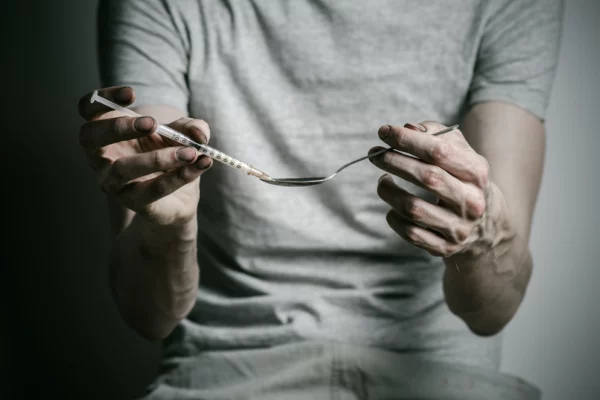Heroin
Heroin addiction is a serious disease and detox is the first step toward combating a psychological or physical addiction. Learn more about heroin, the effects on the human body, withdrawal symptoms and our Los Angeles detox services.
Heroin Addiction & Treatment
Heroin is an illegal substance that is derived from the poppy plant and is highly addictive. Heroin addiction occurs when a person is physically and mentally dependent on this drug and is unable to stop using due to compulsive behaviors. When abused, heroin can produce several physical, psychological, and emotional complications and cause the development of addiction. Heroin is traditionally injected, however it can also be smoked. Those who inject heroin put themselves at greater risk for experiencing collapsed veins, abscesses, infections of the heart or lungs, blood-borne infections such as HIV and hepatitis. It is more common for those who smoke to experience respiratory issues related to their mode of use.
With heroin being illegal, it is not controlled nor evaluated by professionals. As a result, there is no way to tell what exactly may be in heroin or what its potency is, which is extremely dangerous and can be deadly. There is no medical use for heroin at this time despite it having a history of being used as a pain reliever in the past.
What Makes Heroin So Addictive?
One of the many reasons why heroin is addictive is because of the effects it produces. Using heroin creates a euphoria, relaxed, and detached effect that is highly sought after over and over again. But, when heroin is abused, it binds to the opioid receptors in the brain. If that abuse continues and becomes habitual, the brain stops producing the appropriate neurotransmitters that help produce feelings of happiness and contentment. Therefore, one must continue to abuse heroin in order to feel any sense of euphoria, as stopping use will trigger the onset of depressive symptoms.
Heroin withdrawal symptoms can begin shortly after you take your last dose. If you take more, you flood your receptors with pleasure again, and the heroin withdrawal symptoms go away.

Heroin Detox in Los Angeles
One of the reasons it is so challenging to stop using heroin is that the body becomes severely imbalanced when use ends. For many people, heroin withdrawal can be excruciating, and it’s nearly impossible to get through it without assistance and support.
Heroin withdrawal refers to the wide range of symptoms that occur after stopping or dramatically reducing the intake of heroin after heavy and prolonged use. Heroin causes physical dependence, meaning that the body grows to rely on the substance. It also creates psychological issues that lead to further distress when use stops. The chemicals in the human brain after a prolonged use also become imbalanced. This causes many psychological heroin withdrawal effects as well.
Our experienced medical professionals at MD Home Detox in Los Angeles help each individual safely withdrawal from heroin during the detox process.
What Does Heroin Detox Feel Like?
Some of the very first withdrawal symptoms a person can experience include, but are not limited to, the following:
• Agitation
• Anxiety
• Changes In Taste or Smell
• Decreased Appetite
• Fatigue
• Watery eyes
• Insomnia
• Muscle Aches
• Runny Nose
• Sweating
• Yawning
Late symptoms of withdrawal include, but are not limited to:
• Abdominal Cramping
• Diarrhea
• Dilated Pupils
• Goose Bumps
• Nausea
• Severe Sweating
• Vomiting
The withdrawal process can take a long time. Heroin detox is different for everyone depending on their medical and psychological history, their frequency of use and the length of time for which they were addicted. Typically, symptoms come on within 6 to 12 hours of the last dose. Heroin withdrawal symptoms feel like a horrible case of the flu. They peak within 48 to 72 hours. After a week, acute heroin withdrawal should begin to die down. Severe heroin withdrawal symptoms can last from 24 hours to 72 hours, while less severe symptoms may last up to 7 to 14 days.
Heroin withdrawal is generally considered less likely to produce severe health complications or mortality compared with other substances like alcohol or benzodiazepines. Safe withdrawal from heroin can be performed either through the oversight of a medical doctor from home, outpatient or inpatient care at a rehabilitation center, hospital, or treatment center.
Post-Acute Withdrawal Syndrome
It is not uncommon for recovering heroin addict to have post-acute withdrawal syndrome, or PAWS, which produces longer-lasting side effects as the system attempts to find equilibrium. Some of the symptoms of PAWS include:
• Anxiety
• Depression
• Fatigue
• Irritability
• Insomnia
Getting adequate assistance during detox sets the foundation for a successful recovery. Our professionals will tailor their heroin detox plan to address your needs. We can offer medication that relieves or reduces withdrawal side effects. Don’t let the fear of detox stop you from getting the care that you need. The best heroin detox program provides you with physical, mental and emotional support. Undergoing heroin detox at home allows you to stay as comfortable as possible.

Los Angeles Heroin Addiction Treatment
What are Methadone and Buprenorphine?
The use of methadone is primarily overseen by a clinic. When properly prescribed, methadone is non habit-forming and its effects do not create mind-altering effects. Methadone relieves cravings, which is a major cause of relapse for heroin addicts. The effect of methadone can last anywhere from four to six times longer than heroin. Methadone is medically safe to use for weeks, months, and in some cases, even years.
The use of buprenorphine is an alternative method for the detoxification process. It works similarly to methadone, but only partial blocks the opioid receptors in the brain. As a result, buprenorphine tends to be most effective for those who have less intense withdrawal symptoms.
Behavioral therapies
Behavioral therapies have the highest success rate of recovery from addiction. There are many effective behavioral treatments available for heroin addiction. Residential and outpatient approaches combined with a detox have been proven to improve manageability of addiction. Several new behavioral therapies such as contingency management therapy and cognitive behavioral interventions have shown particular promise as treatments for heroin addiction, especially when applied in concert with pharmacological therapies. Contingency management therapy uses a voucher based system, where patients earn incentives based on performance. Cognitive behavioral interventions are designed to help modify the patient’s expectations and behaviors related to drug use. By increasing coping skills meant for dealing with life on life’s terms, patients are able to find solutions other than heroin to deal with various life stressors.
By combining both behavioral and pharmacological treatments, patients have shown the ability to restore normal brain functions and behaviors. Recovery requires long-term maintenance. Recovery results in an increase in employment rates and lower risks of sexually transmitted diseases.



